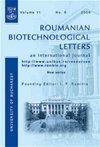Camelina sativa oil can inhibit Campylobacter jejuni but stimulate lactic acid bacteria growth
引用次数: 2
Abstract
Camelina (Camelina sativa L. Crantz) or false flax is an oil crop from the Brassicaceae family. Camelina oil has multiple uses, of which the best known is biofuel production. A motivation for this study was the oil’s high content of omega -3, omega-6 and omega-9 fatty acids, which are known to have an antimicrobial effect. Campylobacter is the most common bacterial cause of human foodborne gastroenteritis in the world. We tested the potential antimicrobial effect of free fatty acids (FFA) from camelina oil against lactic acid bacteria (LAB) and Campylobacter. The in vitro results show that the free fatty acids from camelina oil reduces levels of Campylobacter spp. and increases the levels of LAB showing a potential use of camelina oil as a natural山茶籽油能抑制空肠弯曲杆菌,但能刺激乳酸菌生长
Camelina(Camelina sativa L.Crantz)或假亚麻是十字花科的一种油料作物。山茶籽油有多种用途,其中最著名的是生物燃料生产。这项研究的动机是该油富含ω-3、ω-6和ω-9脂肪酸,这些脂肪酸已知具有抗菌作用。弯曲杆菌是世界上最常见的引起人类食源性肠胃炎的细菌。我们测试了山茶籽油中游离脂肪酸(FFA)对乳酸菌(LAB)和弯曲杆菌的潜在抗菌作用。体外结果表明,山茶籽油中的游离脂肪酸降低了弯曲杆菌属的水平,并增加了乳酸菌的水平,这表明山茶籽油作为天然产物的潜在用途
本文章由计算机程序翻译,如有差异,请以英文原文为准。
求助全文
约1分钟内获得全文
求助全文

 求助内容:
求助内容: 应助结果提醒方式:
应助结果提醒方式:


